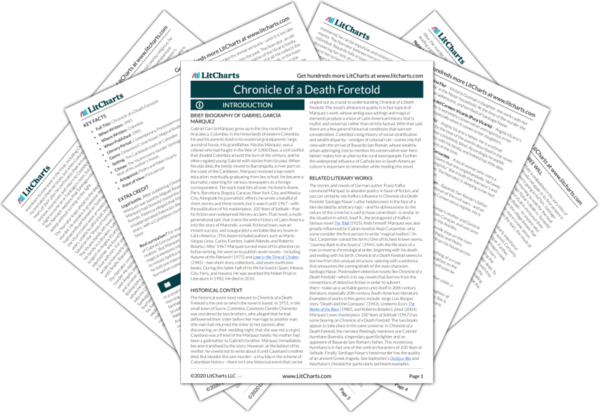The concept of fate is embedded in the very title of the novel, and introduced again in its first sentence: “On the day they were going to kill him, Santiago Nasar got up at five-thirty in the morning to wait for the boat the bishop was coming on.” Santiago Nasar’s death is “foretold” in two senses. First, Pablo and Pedro Vicario announce their intentions —literally “foretelling” the death— to anyone who will listen, and soon nearly everyone in the village knows that Santiago is doomed. Second, in another, more cosmic sense, Santiago’s death seems predestined from the start, the result of a tragic alignment of chance occurrences.
Looked at one way, Santiago’s murder is a clearly intentional act, committed (and enabled) by people in the world. Certainly the Vicario twins choose to kill him, one can argue. Further, many characters—such as Victoria Guzmán, Santiago’s cook, and her daughter, Divina Flor—have the chance to warn Santiago but choose not to, either not understanding the seriousness of the threat or actively wanting Santiago dead. To put it simply: the Vicario twins and their enablers act with free will. Indeed, some of the Narrator’s language supports this interpretation of the tragedy, notably his insistence on calling the murder a “crime.” At other points he even suggests that the entire community, not just the Vicario twins, is culpable.
However, looked at another way, Santiago’s death can be explained only if it is understood as predestined. As the narrator collects the testimonies of the townspeople, he perpetually is mystified by the incredible number of chance occurrences that, in total, created the perfect conditions for Santiago’s murder. The examples are nearly countless, but some of the most prominent include the anonymous note of warning that Santiago fails to notice, Cristo Bedoya’s difficulty finding Santiago, and Plácida Linero’s locking the front door of her house in fright. Further, it becomes clear that the Vicario twins, while acting of their own free will, were also not entirely enthusiastic about killing Santiago, and in some ways tried to be stopped. Then there’s the ultimate mystery: why Angela Vicario offered up Santiago’s name, when all of the available evidence suggests she had nothing to do with him. Some of the narration supports this interpretation of the tragedy as predestined, such as the narrator’s interest in establishing possible portents of the crime—the weather, or Santiago’s dream the night of the wedding. (Perhaps tellingly, these attempts fail.) More explicitly, the narrator throws around words like “destiny,” “fate,” and “sentence,” just about as much as he does “crime.” Finally, the structure of the novel, which announces the death of the main character in its very first sentence, does not allow the reader to imagine any outcome other than the one described at the start.
This coexistence of divine fate and earthly free will is an ancient paradox, central both to Greek tragedy and, more recently and relevantly, the Catholic faith. Is free will just an illusion? If one’s fate is sealed from birth, how is it that a person can act with free will? How can one be held morally accountable for her actions if her future is always already determined? Márquez—operating very much within Catholic modes of thought—seems to answer that fate and free will are somehow, mysteriously, not mutually exclusive. So long as we feel that we have free will, we must bring ourselves to act morally.
Fate vs. Free Will ThemeTracker

Fate vs. Free Will Quotes in Chronicle of a Death Foretold
No one could understand such fatal coincidences. The investigating judge who came from Riohacha must have sensed them without daring to admit it, for his impulse to give them a rational explanation was obvious in his report. The door to the square was cited several times with a dime-novel title: “The Fatal Door.”
She only took the time necessary to say the name. She looked for it in the shadows, she found it at first sight among the many, many easily confused names from this world and the other, and she nailed it to the wall with her well-aimed dart, like a butterfly with no will whose sentence has always been written.
So he put the knife in his hand and dragged him off almost by force in search of their sister’s lost honor.
“There's no way out of this,” he told him. “It's as if it had already happened.”
For the immense majority of people there was only one victim: Bayardo San Román. They took it for granted that the other actors in the tragedy had been fulfilling with dignity, and even with a certain grandeur, their part of the destiny that life had assigned them.
She became lucid, overbearing, mistress of her own free will, and she became a virgin again just for him, and she recognized no other authority than her own nor any other service than that of her obsession.
For years we couldn't talk about anything else. Our daily conduct, dominated then by so many linear habits, had suddenly begun to spin around a single common anxiety. The cocks of dawn would catch us trying to give order to the chain of many chance events that had made absurdity possible, and it was obvious that we weren't doing it from an urge to clear up mysteries but because none of us could go on living without an exact knowledge of the place and the mission assigned to us by fate.
He was so perplexed by the enigma that fate had touched him with, that he kept falling into lyrical distractions that ran contrary to the rigor of his profession. Most of all, he never thought it legitimate that life should make use of so many coincidences forbidden literature, so that there should be the untrammeled fulfillment of a death so clearly foretold.
















